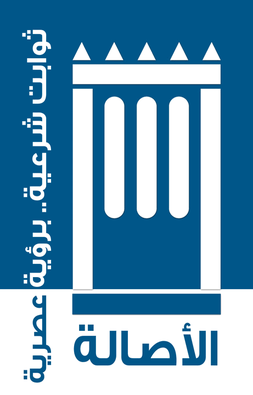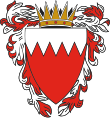
Politics of Bahrain has since 2002 taken place in a framework of a constitutional monarchy where the government is appointed by the King of Bahrain, King Hamad bin Isa Al Khalifa. The head of the government since 2020 is Crown Prince Salman bin Hamad Al Khalifa, who became Prime Minister following the death of Khalifa bin Salman Al Khalifa, and who also serves as Deputy Commander of the Bahrain Defence Force. The parliament is a bi-cameral legislature, with the Council of Representatives elected by universal suffrage, and the Consultative Council appointed directly by the king.

The Muharraq Governorate is one of the four governorates of Bahrain. It is now co-extensive with the municipality of Al Muharraq and with Muharraq Island together with outlying islets. It includes the former municipality of Al Hadd at the southern end of that island.

Islam is the state religion in Bahrain. Due to an influx of immigrants and guest workers from non-Muslim countries, such as India, the Philippines and Sri Lanka, the overall percentage of Muslims in the country has declined since the late 20th century. Bahrain's 2010 census indicated that 70.2% of the population is Muslim. The last official census (1941) to include sectarian identification reported 52% as Shia and 48 per cent as Sunni of the Muslim population.

Al-Wefaq National Islamic Society, sometimes shortened to simply Al-Wefaq, was a Shi'a Bahraini political party, that operates clandestinely after being ordered by the highest court in Bahrain to be dissolved and liquidated. Although from 2006 to 2011 it was by far the single largest party in the Bahraini legislature, with 18 representatives in the 40-member Bahraini parliament, it was often outvoted by coalition blocs of opposition Sunni parties and independent MPs reflecting gerrymandering of electoral districts. On 27 February 2011, the 18 Al-Wefaq members of parliament submitted letters of resignation to protest regime violence against pro-reform Bahraini protestors.

Bahrain has had two constitutions in its modern history. The first one was promulgated in 1973, and the second one in 2002.

Women face widespread discrimination within Bahraini society and the country's political institutions. Women's rights have been a cornerstone of the political reforms initiated by King Hamad, with women gaining the right to vote and stand as candidates in national elections for the first time after the constitution was amended in 2002. The extension of equal political rights has been accompanied by a conscious drive to promote women to positions of authority within government. However, women in Bahrain continue to face gender inequality in many areas of life.

The Consultative Council, also known as the Shura Council, is the upper house of the National Assembly, the main legislative body of Bahrain.
Sheikh Adel Al Mouwda was the second deputy chairman of Bahrain's parliament of 2002, the Chamber of Deputies, and the former leader of salafist party, Asalah. Sheikh Al Mouwda is considered the leading spokesman for political Islam in Bahrain and is known for his forthright views, which has seen him often quoted in the international press.

The National Justice Movement, also known as the al-Adala Society, is a secular and Arab nationalist political party in Bahrain.
Sheikh Mohammed Khalid Ibrahim is a Bahraini Islamist politician and a member of the Al-Menbar Islamic Society in Bahrain. He was an MP in the lower house of the Bahraini parliament, having been elected in the 2002 Bahrain parliamentary elections representing a constituency from the Northern Governorate. Khalid is a known outspoken critic of the Bahraini government over conservative issues such as the selling of alcohol.
Munira Fakhro is a Bahraini academic and was a candidate in Bahrain's 2006 general election for the opposition Waad.

The Al-Menber National Islamic Society is the political wing of the Sunni Islamist Al Eslah Society in Bahrain and Bahrain's branch of the Muslim Brotherhood. The president and patron of the Al Eslah Society is Shaikh Isa bin Mohammed Al Khalifa, a member of the Al Khalifa royal family and former labor minister of Bahrain. Prominent members of Al-Menber include Salah Abdulrahman, Salah Al Jowder, and outspoken MP Mohammed Khalid. The party has generally backed government-sponsored legislation on economic issues, but has sought a clampdown on pop concerts, sorcery and soothsayers. Additionally, it has strongly opposed the government's accession to the International Covenant on Civil and Political Rights.

General elections were held in Bahrain in November and December 2006 to elect the forty members of the Council of Representatives. The first round of voting was held on 25 November, with a second round on 2 December 2006.

The Al-Asalah Islamic Society is the main Sunni Salafist political party in Bahrain. The party is the political wing of the Islamic Education Society which funds the party. Asalah's leader is Ghanim Al Buaneen, who took over in 2005 from Adel Mouwda, who was sacked because he was perceived to be too close to Shia Islamists in the Al-Wefaq party. Asalah is most popular in the conservative bastions of Muharraq and Riffa. Asala often aligns with Al-Menbar to outvote Al-Wefaq.

The following outline is provided as an overview of and topical guide to Bahrain:

General elections were held in Bahrain in October 2010 to elect the forty members of the Council of Representatives. The first round of voting was held on 23 October, with a second round on 30 October. Amidst boycotts and arrests, Al Wefaq won 18 of the 40 seats. Four women were elected.

General elections were held in Bahrain on 24 October 2002 to elect the forty members of the Council of Representatives. They were the second general elections in the country's history, and the first since the dissolution of the 1973 National Assembly.

General elections were held in Bahrain in November 2014 to elect the forty members of the Council of Representatives. The first round of voting took place on 22 November, with a second round on 29 November in the 34 constituencies in which no candidate received a majority.

General elections were held in Bahrain in November and December 2018 to elect the 40 members of the Council of Representatives. The first round of voting was on Saturday, 24 November, with a second round in 31 constituencies on Saturday, 1 December. A municipal poll coincided with the parliamentary vote.

General elections were held in Bahrain on 12 November 2022 to elect the 40 members of the Council of Representatives, with a second round in some constituencies on 19 November.










